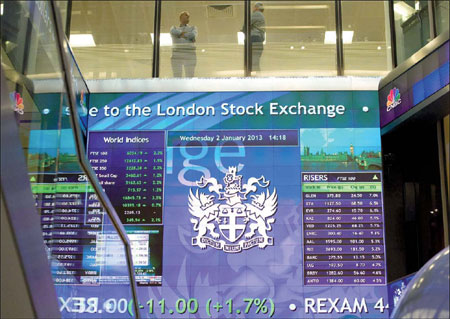AIM not such a long shot

|
More Chinese companies have turned to overseas capital markets, including the London Stock Exchange, to raise funds. Paul Hackett / Reuters |
Increased transparency makes investing in Chinese companies worth the risk
London's investment community is increasingly developing the expertise to help Chinese companies raise funds on its capital markets, aided by a surge of such companies expanding their overseas footprint in recent years.
Based on experience in recent years, these advisers increasingly understand how to carry out detailed due diligence for their Chinese clients and offer them suitable advice on strengthening corporate governance measures.
Their help has become important for Chinese companies, particularly after the global downturn in 2008 when investors became more wary about buying into foreign businesses with which they are less familiar.
Nicholas Emmerson, a partner at Eversheds, an international law firm, says that London's lawyers are increasingly experienced at working with Chinese lawyers to carry out due diligence for Chinese companies.
Since most of the Chinese listings in London have happened after 2005, many London-based lawyers did not initially know how to search in the "most obvious places" for problems that Chinese companies are likely to have, he says.
"For Chinese companies, it is important to check that the key assets are owned by the company, check the company's suppliers and customers, and make sure that key employees have the correct employment contracts," Emmerson says.
This is important especially for Chinese family businesses, which may not realize that a company is a separate legal entity to the owners, so the assets used by the company may still be held by the individuals, he explains.
Currently there are about 10 Chinese companies listed on the London Stock Exchange's main exchange, and about 40 on its junior exchange, the Alternative Investment Market.
Many of the AIM-listed Chinese companies joined in the boom market of 2006, when London's investors were much more willing to take on risks investing in foreign businesses with which they were less familiar.
However, this wave of new listings included some poor-quality Chinese companies that committed fraud and incurred significant losses for their investors.
For example, Chinese lottery operator Betex delisted from the AIM in 2007 after Chinese authorities detained two senior staff members for illegal gambling. In 2008, the chief executive and majority shareholder of Chinese mobile-phone handset maker ZTC Telecoms disappeared after using shares in the company as collateral for a loan.
Today's Top News
- Xi stresses improving long-term mechanisms for cyberspace governance
- Experts share ideas on advancing human rights
- Japan PM's remarks on Taiwan send severely wrong signal
- Key steps to boost RMB's intl standing highlighted
- Sustained fight against corruption urged
- Xi calls for promotion of spirit of volunteerism































